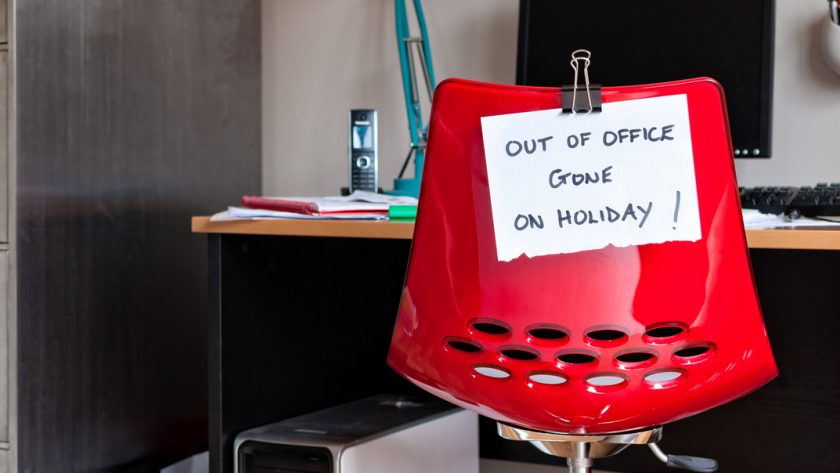Tomorrow is free. You still do the last tasks for the day, tidy up your desk, and then: Just quickly formulate a text for the out-of-office notice. Some people seem to be mentally already on their day off. At least some of the out-of-office messages you receive give that impression. How to do it better and what real no-gos are.
Why vacation notes are important
With a hot needle: out-of-office notes are often quickly written at the last minute – without thinking too much about content and form. The main thing is that the recipient knows that he cannot expect an answer from you anytime soon.
But the vacation notice is more important than you might think. Because even this short, inconspicuous text is a kind of business card for your company. It can influence whether customers feel that they are in good hands and whether they perceive the company as professional and competent.
If your out-of-office text is full of errors, inadequate or dubious informational content, it can have negative effects. So you better take a little time to write good, meaningful text for your out-of-office reply and avoid typical mistakes.
Don’t: The courtesy is already absent
“I am currently unavailable. Your email will not be forwarded. “

Mistake: Getting to the point, in a nutshell, is generally a good thing in professional life, but this example takes it too extreme. The message does not contain a single word that expresses courtesy and appreciation for the recipient – no “thank you” or “unfortunately”. Besides, no help is offered to him in any way. He has to think that the sender doesn’t care about his concern. That can cost you sympathy points – and even a customer for urgent inquiries.
Better: Be polite, refer to colleagues. Below is an example of a good vacation notice.
Don’t: return uncertain
“Thank you for your email. Unfortunately, I am currently out of the office and cannot process your request. I will personally take care of your concerns as soon as I get back. Sincerely, XYZ “
Mistake: The author is polite and offers help. However, the recipient does not know when the author will be back and he can expect an answer.
Better: Enter a specific date from which you can be reached again.
Don’t: Help yourself, then God will help you
“Thank you for your email. Unfortunately, I will not be in the office from August 10 to 24, 20XX, and cannot process your request. If your concern is still relevant when I return, I will get in touch with you as soon as possible. With best regards, XYZ “
Mistake: The recipient will find out when the author will be back, but he will not be given an alternative contact person. It doesn’t feel well looked after. In urgent cases, he may have to call half of the company so that his request can be processed.
Better: Name a specific contact person, with contact details and a note that the mail will not be automatically forwarded to him. It is important to have a good holiday handover beforehand with the colleagues who will represent you. This is the only way they can really help with inquiries.
Don’t: Clown had breakfast
“Thank you for your email. I ran away with our postage and will not be back until the money runs out, probably on 08/24/2019. If you have urgent inquiries, please contact my colleague Ernst Müller (telephone number, email address). With best regards from Mexico XYZ “
What is bad about it: It contains all the important information, but the humor certainly does not suit everyone. Obviously, word got around, because such more or less moody out-of-office notes have become rarer in the meantime. Bear in mind that your managing director may also benefit from such lines if he should write you an email while you are on vacation. New customers who receive such an answer as their first contact should not be blamed if they prefer to contact the competition with their request.
Better: It goes without saying … stick with the facts and be brief.
Don’t: Greetings on the balcony
“I am currently lying on my sun lounger on the balcony with a delicious gelato in my hand and unfortunately I cannot answer your e-mail. When I am back on MM/DD/YYYY, I will be happy to get in touch with you. Until then, my colleague Ernst Müller (phone, email address) will take care of urgent matters. Sunny greetings XYZ “

Mistake: Even if you have a close relationship with your business contacts: Holiday greetings have no place in the out-of-office message. Obviously, the recipient is not on vacation but has a business issue that he would like to clarify. Customers and business partners with whom you get on well can tell you personally about your vacation after your return. And think of possible inquiries from new contacts here, too.
Better: Stay factual.
Do these examples sound familiar? Have you ever been annoyed about missing contact persons for urgent matters or upset about bad jokes?
Writing a good, informative out-of-office reply isn’t as natural as you might think.
Do: This is how you formulate a successful out-of-office notice
The examples have shown it: A good out-of-office message does not have to be entertaining or particular individual. First and foremost, the text must contain all information relevant to the recipient. These are the following:
- When will you be available at work again?
- Are your emails automatically forwarded to a colleague? If so, include their name.
- If there is no automatic forwarding: Who can the recipient contact and how does he reach the alternative contact person? Enter their phone number and email address.
- Will you process the email when you return?
An example of a complete, meaningful vacation notice:
“Thank you for your email. Unfortunately, I cannot answer you personally at the moment. I will be back at work from [dd.mm.yyyy] and will not have access to my e-mails until then. As soon as I get back, I will take care of your request. Please understand if it takes a little longer than usual for you to receive an answer.
Your message will not be forwarded automatically. My colleague XY (email address & telephone number) is available as a contact person for urgent matters.
Sincerely,
XYZ”
Keyword data protection: You do not have to mention in the out-of-office message why you are not in the office. The information that you cannot be reached for a certain period of time is sufficient.




